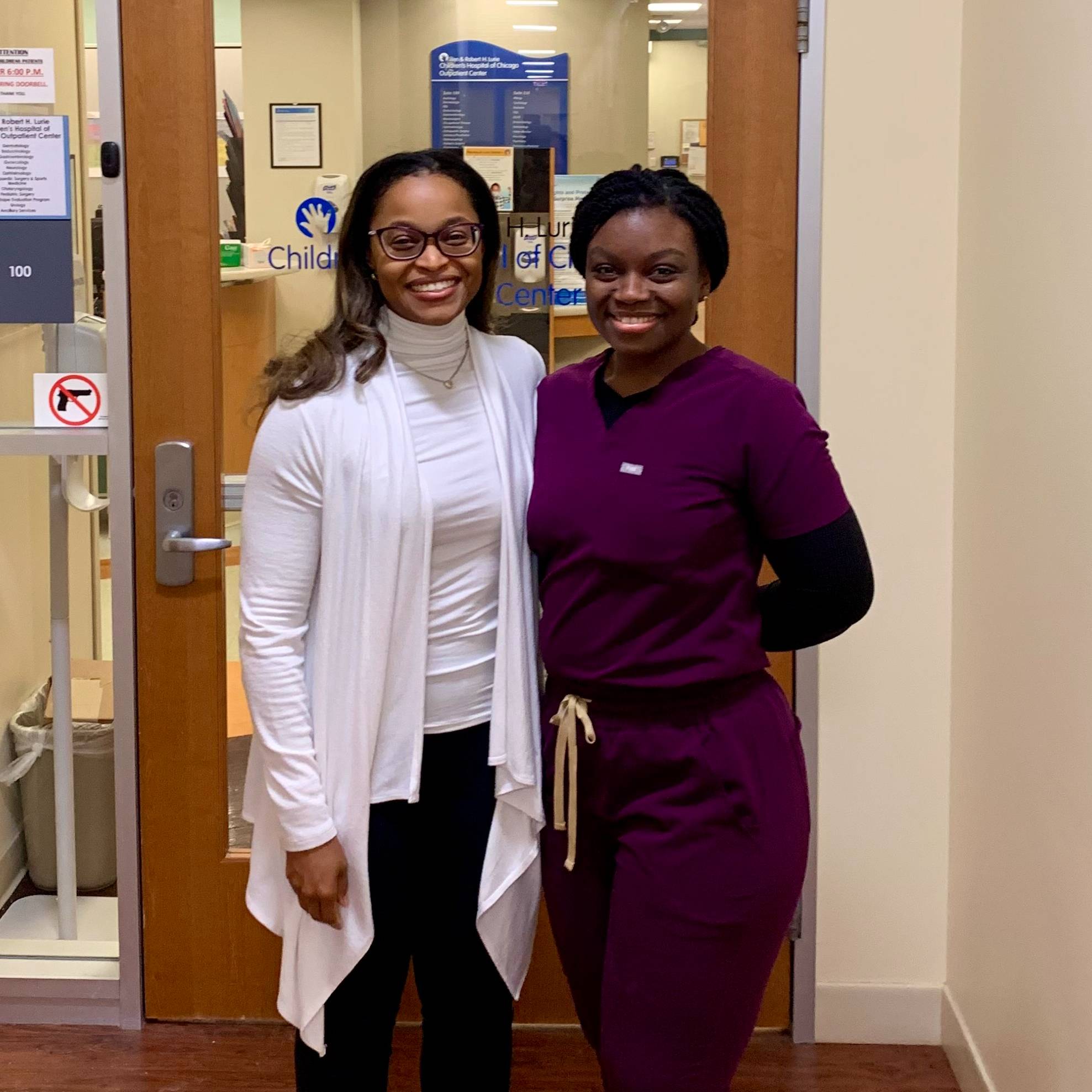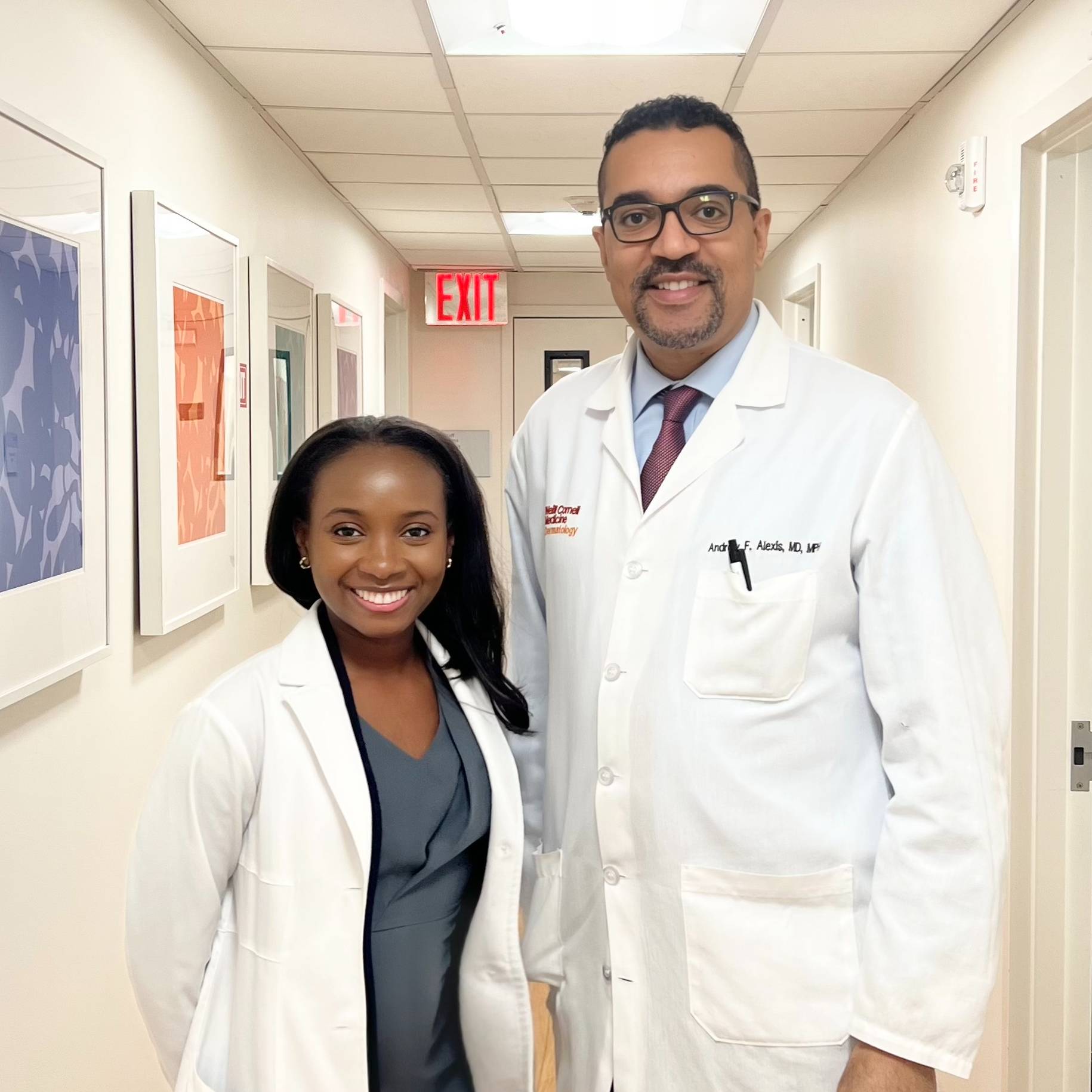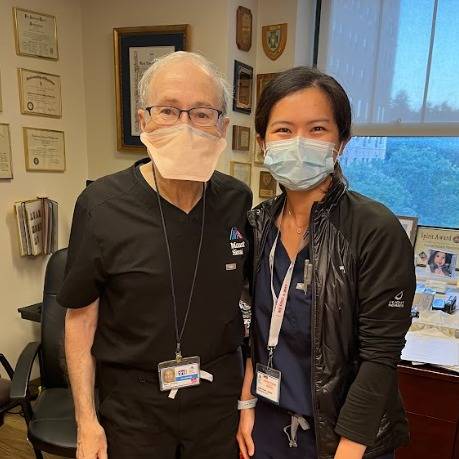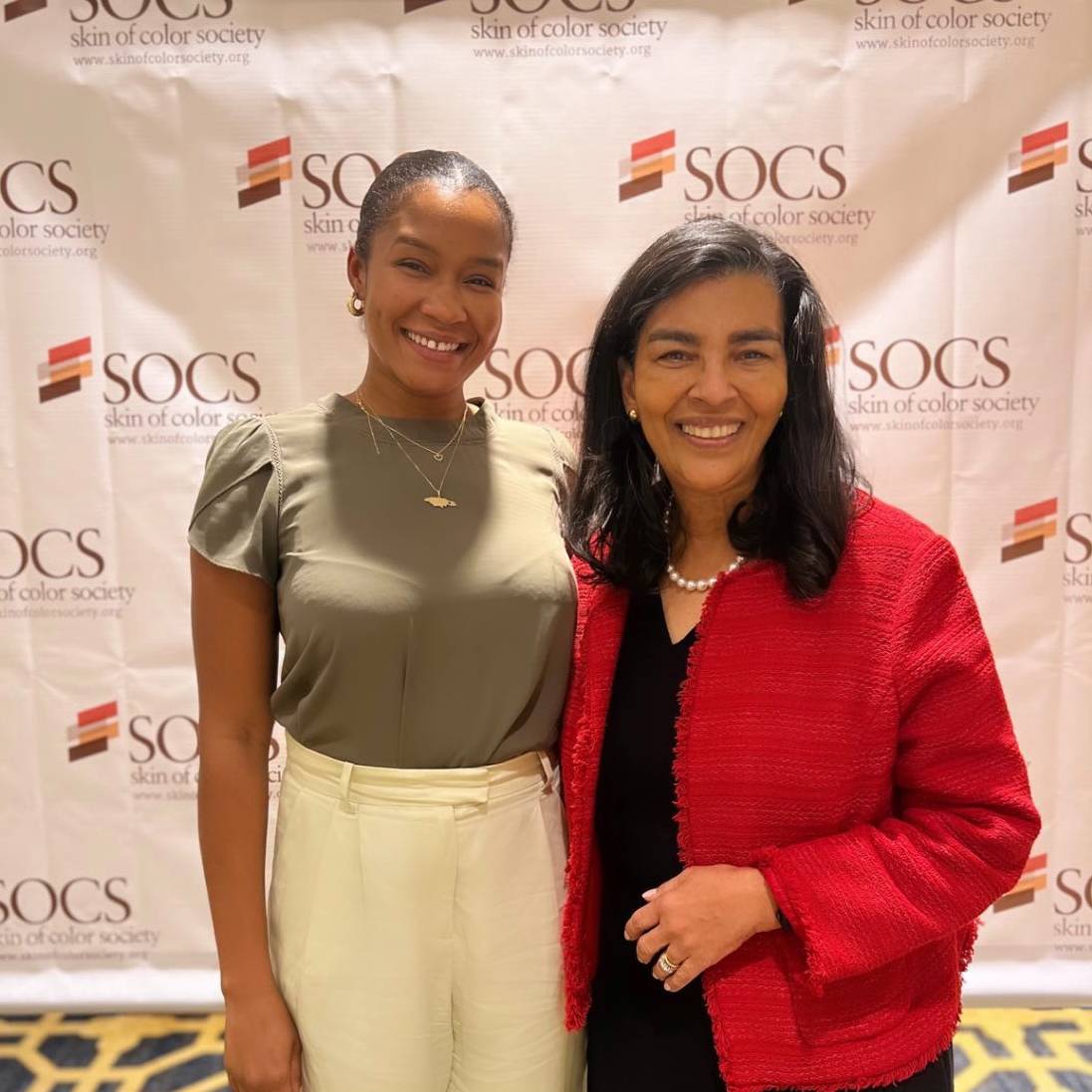
Mentee: Charissa Obeng-Nyarko, MS
Mentor: Brandi Kenner-Bell, MD, FAAD
Northwestern University Feinberg School of Medicine
I am very thankful to the Skin of Color Society (SOCS) for the opportunity to participate in the observership program. My three weeks at Lurie’s Childrens in Chicago with my mentor Dr. Kenner-Bell was productive and full of adventure. Also being in Chicago in the dead of winter during this rotation will always be a memorable experience, as a Floridian!
Before this rotation, I had limited knowledge about pediatric dermatology and sought this opportunity to explore this. To my surprise, on my first day, I was in the operating room observing surgical excisions for two cases of nevus sebaceous! From participating in PCOS multidisciplinary specialty clinic to Vascular lesion clinic, I believe this rotation revealed the diversity of pediatric dermatology. I had the opportunity to participate in a multi-specialty clinic for PCOS. The team included a pediatric dermatologist, endocrinologist, adolescent medicine specialist, obesity medicine specialist, pediatric resident, and registered dietitian. This specialty clinic allowed pediatric patients with PCOS to seamlessly see all their providers (in separate encounters) in one trip to the hospital – which was innovative.
I also had a chance to see patients with rare dermatoses like Gorlin Syndrome, cutis marmota telangiectatica congentia, and serum sickness-like reaction in a patient with PHACE Syndrome. It was a pleasure seeing these patients and their families navigate living with an uncommon genodermatosis.
Everyone I interacted with on outpatient and inpatient teams was welcoming and approachable. I thoroughly enjoyed clinic days with Dr. Kenner-Bell and her team. I am inspired by her dedication to her patients, career, and family. She is truly a gem! I thank Dr. Kenner-Bell and the SOCS Mentorship Program for this opportunity!
Mentee: Shreya Deoghare, MBBS
Mentor: A. Shadi Kourosh, MD, FAAD
Massachusetts General Hospital
I am very thankful to the Skin Of Color Society (SOCS) for my selection for SOCS Observership program 2022 and the mentorship chairs Dr. Eva Kirby and Dr. Neelam Khan, for their constant support and motivation to make this possible. It was an honor to pursue a three week Observership at Massachusetts General Hospital at Boston, with Dr. Shadi Kourosh as my mentor. Dr. Kourosh is a very accomplished dermatologist and very well guided me about future career opportunities in dermatology.
I had a great opportunity to observe and learn about various dermatoses, especially the pre-cancerous skin conditions as well as melanocyte and non- melanocytes skin cancers – conditions that are uncommon in India.
I also had a chance to learn about the advance treatment guidelines, like biologicals and other new molecules for common diseases like psoriasis and atopic dermatitis among many others. This has definitely helped me meet my goals of improving my clinical skills as a dermatologist, to diagnose skin disorder across all skin types as well as learn about the advanced treatment modalities, that are not yet the standard of care in India. I also got a chance to rotate at the combined dermatology-rheumatology clinics and in-patient dermatology consults at MGH.
My experience at MGH Revere and MGH Chelsea, was a great one as well ! I was amazed to see the standard of healthcare being provided even at peripheral locations. This Skin of Color Observership program helped not only in my professional growth but also personal growth, by supporting me to take a step ahead and move outside my country to acquire advanced knowledge and skills in dermatology. I am very grateful to the SOCS and sponsors for this opportunity.

Mentee: Renee Haughton, MD
Mentor: Andrew Alexis, MD, MPH, FAAD
Weill Cornell Medicine
I had a wonderful learning experience working with Dr. Alexis in his clinic for two weeks. He is the only dermatologist at his clinic location which is about a 20-minute walk from the York St. site where the resident hub is. He has a close-knit team of medical assistants, administrative assistants, and scribes that keep the clinic functioning very smoothly. His schedule was always packed and the days were fast paced which I appreciated because I was able to get the most out of my short time there. Dr. Alexis has a great bedside manner and I learned so much about his thought process just from how clearly he communicated his clinical reasoning and management plans to his patients.
I rarely needed to ask questions because of this but when I did, he was a thoughtful teacher, often recommending books and chapters in his library to look at. He sees a mix of general dermatology and cosmetic dermatology. I saw a broad range of pathology in diverse skin tones with the most common being dyschromias such as lichen planus pigmentosus and alopecias. On the cosmetics side, I learned more about how lasers worked and how to perform lasers safely in skin of color. During clinic, I would often be tasked with doing quick literature searches to help with counseling and management. It was also very hands-on, as I had the opportunity to assist with cosmetic procedures as well as biopsies. One day a week, I joined Dr. Alexis when he oversaw the resident continuity clinic. This was where I had the opportunity to staff patients, show my clinical reasoning skills, and develop my own management plans.
Dr. Alexis also had a team of research fellows who I was able to interact with. I sat in on informal research meetings and learned about their on-going clinical trials and other clinical project ideas. There was ample opportunity to collaborate with their team. I was able to discuss two of my proposed research projects with Dr. Alexis which are underway. Overall, I highly recommend this experience and I am very thankful for the Skin of Color Society and Dr. Alexis for supporting me.

Mentee: Jennifer Laborada, BS
Mentor: Mark Lebwohl, MD
Icahn School of Medicine at Mount Sinai
As a student without a home dermatology program, I am incredibly thankful to the Skin of Color Society and to my mentor Dr. Mark Lebwohl for this valuable experience. Over the course of 4 weeks, I worked alongside Dr. Lebwohl in the dermatology clinic at Mount Sinai Hospital. From the first day, I was welcomed as part of the team and given proper introduction and training. With each patient, I learned to take a thorough history and deliver a concise oral presentation. Through carefully observing Dr. Lebwohl during patient encounters, I gained insight into his clinical reasoning and decision making. In particular, it was helpful to hear his expertise in counseling patients on various topics, from psoriasis to biologics to skin cancer.
Above all, what was most memorable to me was Dr. Lebwohl’s compassion and excellent bed-side manner towards his patients. He is an excellent role model, and I aspire to deliver the same exceptional patient care as a future dermatologist.
Outside of clinic, I engaged in didactics and various scholarly pursuits with my mentor’s guidance. Upon seeing an interesting case of dupilumab-induced guttate psoriasis, I wrote up a case report and submitted it for publication. In addition, I joined an exciting research project to develop a more objective tool for assessing the severity of psoriasis in skin of color, which I am continuing to this day. Although the Observership is over, the knowledge and skills I acquired are indeed life-long and instrumental in developing my career as a future leader in skin of color dermatology.

Mentee: Nia James
Mentor: Lynn McKinley-Grant, MD, FAAD
Howard University
I spent my SOCS observership with Dr. McKinley Grant in Washington D.C. During this time, we had the opportunity to work closely on a project of equal interest and enthusiasm: Art and Dermatology. During my observership we created a bridge between the Howard School of Medicine, and Chadwick A. Boseman College of Fine Arts. Through several planning meetings, and exchange of ideas, we put together the Art and Dermatology grand rounds event. We brought dermatology residents, attendings, and medical students from Howard, Georgetown, and GW to the Howard University Art Gallery for a morning of teaching and art observation. The Art and Dermatology grand rounds consisted of lectures on color theory, history, photography, and a special word from the Dean of Fine Arts, Phylicia Rashad. After this, trainees went to the gallery, where they broke up into small groups, each led by an art student. Groups analyzed each painting, taking careful note of color, undertones, shape, movement, and texture, then presented their thoughts to the larger group. This activity was designed to help students grow their descriptive terminology, refine the eye, become comfortable with ambiguity, and increase empathy. Residents remarked that the event was insightful in serving as a catalyst to expand their clinical descriptions of skin presentations and adopt a more detailed approach when looking at gross and microscopic pathology.
Through my SOCS observership with Dr. McKinley grant I gained a profound understanding of the symbiotic relationship between the realms of art and dermatology. The experience allowed me to witness the transformative power of interdisciplinary collaboration. Working on the grand rounds project not only honed my organization and planning skills, but also deepen my appreciation for the potential impact of merging seemingly disparate fields. This event enhanced my ability to appreciate the intricate details of both dermatology and fine art, fostering a more nuanced and empathetic approach to dermatologic diagnosis. I was encouraged to transcended traditional boundaries, refine my observational skills, confront my own relationship with ambiguity, and ultimately recognize the broader connections in the realm of health care and education.
Lastly, from this experience I've had the invaluable opportunity to form a relationship with a mentor with similar interests and values. I'm excited to continue working on projects involving art and dermatology with Dr. McKinley Grant. As we continue to create an exchange between the school or art, and the school of medicine here at Howard, I continue to learn just how integrated these two fields are. This experience has afforded me the opportunity to seek guidance in a mentor who has a long-standing interest in this area of education. The SOCS observership has granted me with this invaluable experience and relationship, and I look forward to the future projects that are in store.